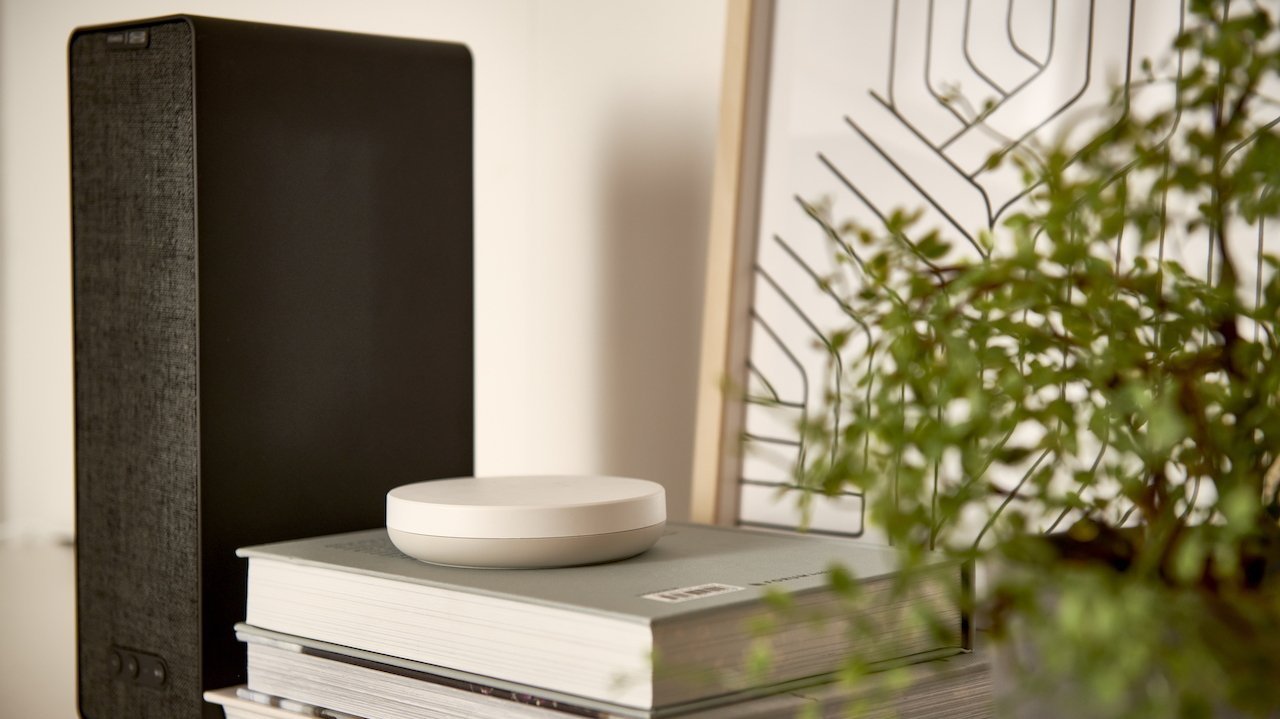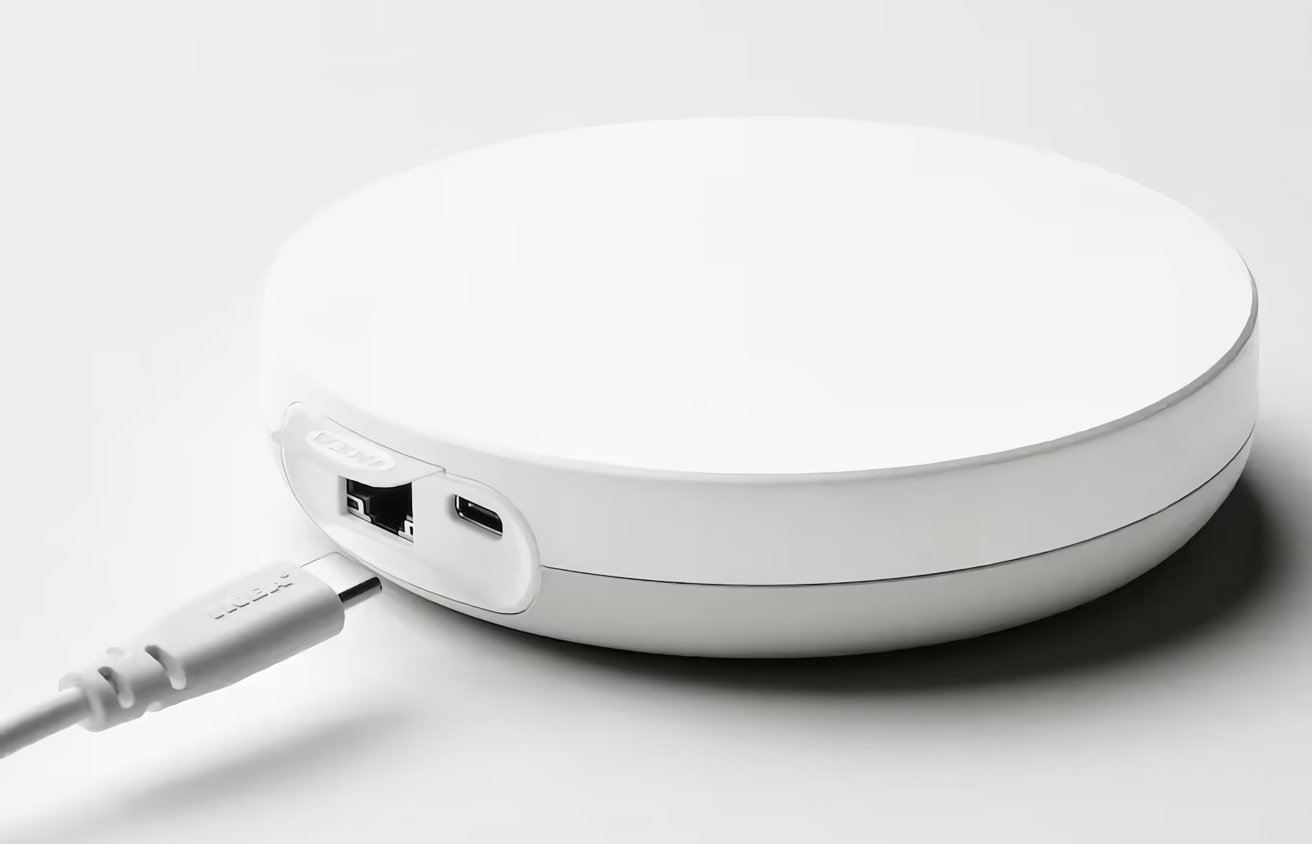Ikea HomeKit hub with Matter support set for November release
Ikea's updated Homekit-compatible Dirigera smart home hub with Matter support is anticipated to go on sale in Europe in November for under $60.

Ikea launched its Dirigera smart home hub in May, as a replacement for the existing Tradri hub. Months later, it now seems that Ikea is preparing to put the hardware on sale to the public.
An online store listing spotted by TechGamingReport shows it will be going on sale in Germany for 59.99 euros. Further research byThe Verge shows the hub as appearing on the Spanish and Norwegian websites as well, with the latter adding sales will "start in November."
While release details for other territories remains largely unknown, the release is a good sign for HomeKit users. The Dirigera will handle more product categories and deal with more devices in total than the Tradri hub, as well as support Matter.

Matter is a standard that Apple and other tech giants are supporting, as a way for smart home devices to more easily communicate with each other. By using a single protocol, the standard should allow for more interoperability between competing smart home platforms, and get more hardware designed for one platform to more readily work with others.
Matter-certified devices will work with HomeKit, the Google Assistant, Amazon's Alexa, Samsung SmartThings, and other platforms.
Along with Matter and HomeKit, the Dirigera hub will also be able to communicate using Wi-Fi, Thread, and Zigbee, enabling it to work with many different devices. Its physical connections include an ethernet port and USB-C, with the latter used for power.
As well as using HomeKit, Ikea is also including support for a new Home Smart app, which will be released alongside the hub.
Read on AppleInsider

Ikea launched its Dirigera smart home hub in May, as a replacement for the existing Tradri hub. Months later, it now seems that Ikea is preparing to put the hardware on sale to the public.
An online store listing spotted by TechGamingReport shows it will be going on sale in Germany for 59.99 euros. Further research byThe Verge shows the hub as appearing on the Spanish and Norwegian websites as well, with the latter adding sales will "start in November."
While release details for other territories remains largely unknown, the release is a good sign for HomeKit users. The Dirigera will handle more product categories and deal with more devices in total than the Tradri hub, as well as support Matter.

Matter is a standard that Apple and other tech giants are supporting, as a way for smart home devices to more easily communicate with each other. By using a single protocol, the standard should allow for more interoperability between competing smart home platforms, and get more hardware designed for one platform to more readily work with others.
Matter-certified devices will work with HomeKit, the Google Assistant, Amazon's Alexa, Samsung SmartThings, and other platforms.
Along with Matter and HomeKit, the Dirigera hub will also be able to communicate using Wi-Fi, Thread, and Zigbee, enabling it to work with many different devices. Its physical connections include an ethernet port and USB-C, with the latter used for power.
As well as using HomeKit, Ikea is also including support for a new Home Smart app, which will be released alongside the hub.
Read on AppleInsider

Comments
Thanks for that explanation of the issues @dewme — I hope all this effort does actually make things easy; but I've a nagging worry that this hidden complexity might leak out, creating confusion, obstacles and disappointment for users.
Fingers crossed this Matter/Thread lark works out well.
Matter and Thread are both very sound and well conceived approaches to solving the problems they are each trying to solve. Matter provides an application layer protocol standard that allows any client application from any vendor, like Apple’s HomeKit, and any device from any device maker, like IKEA, to interoperate over IP networks, which are the most prevalent networks in the world. Thread is a low bandwidth IP based mesh network for low powered devices, which allows the use of battery operated devices to last for years without recharging or changing batteries.
The most compelling case for supporting Matter and Thread is that they provide technical innovation, which only results when something actually delivers value to people, without inventing anything new, other then the protocol itself, which is still derivative. The underlying technology bits are all standard off-the-shelf stuff, like WiFi (IEEE 802.11), 6LowWPAN (IEEE 802.15.4 - Thread), TCP/IP, UDP, IPV6 and Bluetooth LE.
Is this a lark? I don’t think so. But it isn’t all puppies and kittens either because there are already plenty of people who have invested in pre-Matter systems like Zigbee and Z-Wave/Z-Wave Plus. Some of these systems like Z-Wave Plus are very well engineered, modern, secure, and well supported solutions that already deliver many of the same qualities that Matter is promising to deliver, outside of being open and based on off-the-shelf infrastructure technology. Owners of these systems aren’t going to retire those systems when they have many years of service life remaining. They can however start augmenting those system with Matter devices by using a gateways to bring Matter devices into their existing system or vice versa, bring the devices from those other systems into a Matter based system.
Hopefully the IKEA hub can support non-HomeKit Thread devices.
I guess we will see what Apple’s real end game is whenever they roll out support for Matter. They can make their Home App a full fledged Matter client, they can stick their HomeKit application layer on top of a full Matter stack (like they’ve done with Thread in HomePod mini and ATV 4K), or the can run Matter and HomeKit side-by-side with the new Home App being an aggregation/integration layer.
The Matter standard expects the connection endpoints to be talking Matter and Apple expects the connection endpoints to be talking HomeKit. I don’t foresee Apple giving up anything when it comes to HomeKit, so the better scenario for the most number of end users would be for the new Home App to be an aggregator/integrator so it can manage non-HomeKit devices as full fledged members of a home automation system along with its HomeKit devices.
I have five Nanoleaf bulbs set up with Thread and Homekit - they work great together! Matter will just add many more options.